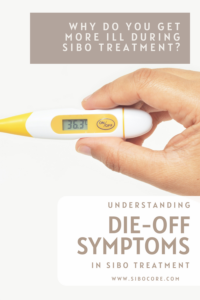The Treatment for SIBO (Small Intestinal Bacterial Overgrowth) is not a clearcut solution. This disorder in which too much bacteria grow in your small intestines can cause a whole list of different symptoms, from digestive (bloating / floating stools) to emotional (fatigue and anxiety). But what if the treatment is making you sicker? Are you feeling like you got the flu on top of your antibiotic treatment? You might be experiencing die-off symptoms. This blog post will go deeper into what are die-off symptoms and how can
1. What is SIBO Die-Off?
So, you’re starting treatment for SIBO (Small Intestinal Bacterial Overgrowth)—that’s a great step! But as your body begins to clear out the harmful bacteria in your small intestine, you might notice some uncomfortable side effects known as “die-off symptoms.” These reactions happen when the bacteria start to break down, releasing toxins that your body needs to flush out.
Did you know? Die-off symptoms are also called the Herxheimer reaction (yes, it’s a mouthful!). This reaction was first noticed over a hundred years ago in people being treated for bacterial infections (in that case, syphilis)—proving that sometimes you feel a bit worse before you feel a lot better.
In simpler terms, these die-off symptoms are like your body’s way of saying, “Hey, I’m working on this!” The most common ones are fatigue, headaches, and bloating, and while they are annoying, they usually only last a few days or weeks.
Did you know? Not everyone gets die-off symptoms, and things like your treatment type, the amount of bacteria, and even your personal health can all play a role.
If you’re experiencing these symptoms, remember it’s a sign that your body is working hard to create a healthier gut environment. Here are a few tips to handle the symptoms and hopefully they’ll be gone for better soon.
2. Die-Off Symptoms to Expect During SIBO Treatment
When you’re treating SIBO, it’s natural to wonder if the symptoms you’re experiencing are just part of the process. The good news is that many die-off symptoms are well-known! Here’s what you might expect, along with a few tips for making them a bit easier to handle.
-
Fatigue: Feeling more tired than usual? This is one of the most common die-off symptoms. Your body is using a lot of energy to flush out those toxins, so you may feel like you need extra rest. Listening to your body and sneaking in a nap (if possible) can help!
-
Headaches and Brain Fog: Some people notice a dull headache or even feel “foggy” mentally. This is due to the extra work your liver and kidneys are doing to clear out waste. Staying hydrated is key here—lots of water can help flush things through your system.
-
Digestive Discomfort: Die-off symptoms can sometimes feel similar to regular SIBO symptoms, like bloating, gas, or stomach cramps. This can be confusing, but it’s usually a sign of your body adjusting to the treatment. Eating simple, bland foods can often ease this discomfort a bit.
-
Mood Changes: It might surprise you, but as the gut bacteria change, some people notice mood shifts, too! The gut and brain are closely connected, so don’t worry if you feel a bit off. Gentle activities like walking, journaling, or listening to music can be helpful.
3. Are my symptoms from SIBO, die-off or something else?
It can be tricky to tell the difference between die-off symptoms and a worsening of SIBO itself. Here are a few clues to help you distinguish between the two:
-
- When do you experience symptoms? Usually, die-off symptoms start within the first few days of starting treatment and go away within a week to ten days. If you’re symptoms stay for longer than that, start at a much later time or get worse as time goes on, it might be that your treatment isn’t working for you.
-
- What are the symptoms? Die-off reactions often come with systemic symptoms like headaches, fatigue, and body aches, which aren’t typically associated with SIBO on its own. Instead, they are more similar to a flu. The general feeling of being ill with the flu is not usually connected to SIBO and might make it easier for you to know this is due to the treatment.
- How are you symptoms holding up?: If your symptoms fluctuate in waves—getting worse for a short period before improving—this may be a sign of a die-off reaction.
If you experience extreme symptoms, like persistent vomiting, extreme fatigue or your symptoms just don’t go away, even after your treatment is finished, it’s probably not die-off symptoms and it would be wise to contact a doctor.

4. Easy Ways to Ease SIBO Die-Off Symptoms
Die-off symptoms can be uncomfortable, but there are some simple ways to make them more manageable. Here are a few practical tips to help you feel better as your body adjusts:
-
Stay Hydrated: Water is your best friend during die-off. Drinking plenty of water helps flush out toxins and can make symptoms like headaches and fatigue a bit easier to handle. Try keeping a water bottle handy and sip throughout the day—herbal teas or coconut water can also be great options for added hydration.
-
Rest, Rest, Rest: Fatigue is common with die-off symptoms, so make rest a priority! Listen to your body and allow yourself to take breaks or short naps if you need them. Remember, healing requires energy, so rest isn’t just allowed—it’s encouraged.
-
Eat Light and Gentle Foods: To avoid adding more stress to your digestive system, stick to simple, gentle foods. Think steamed veggies, broth-based soups, or plain rice. Avoid foods that are tough to digest or that might trigger symptoms, like dairy, caffeine, and very spicy foods.
-
Probiotics with Caution: While probiotics can support gut health, they might also make die-off symptoms worse if introduced too quickly. Consult with your healthcare provider to determine the right timing and type of probiotic for you.
-
Practice Relaxation Techniques: Stress can sometimes make die-off symptoms worse, so relaxation is key. Deep breathing exercises, meditation, or even just a few minutes of quiet time can work wonders. These practices can help reduce overall stress and keep your body focused on healing.
These easy adjustments can go a long way in easing die-off symptoms, giving your body a bit of extra support as it clears out those toxins.
Conclusion
Experiencing die-off symptoms during SIBO treatment is a sign that the treatment is actively targeting the bacterial overgrowth in your gut. While these symptoms can be uncomfortable, they are usually temporary and manageable with the right strategies. Staying hydrated, supporting your body’s detoxification, and working closely with your healthcare provider will help you get through this phase and on your way to feeling better.
Understanding the nature of die-off reactions can empower you to be patient and persistent in your SIBO treatment journey. Remember, it’s a marathon, not a sprint, and each step is bringing you closer to improved gut health and overall well-being.


